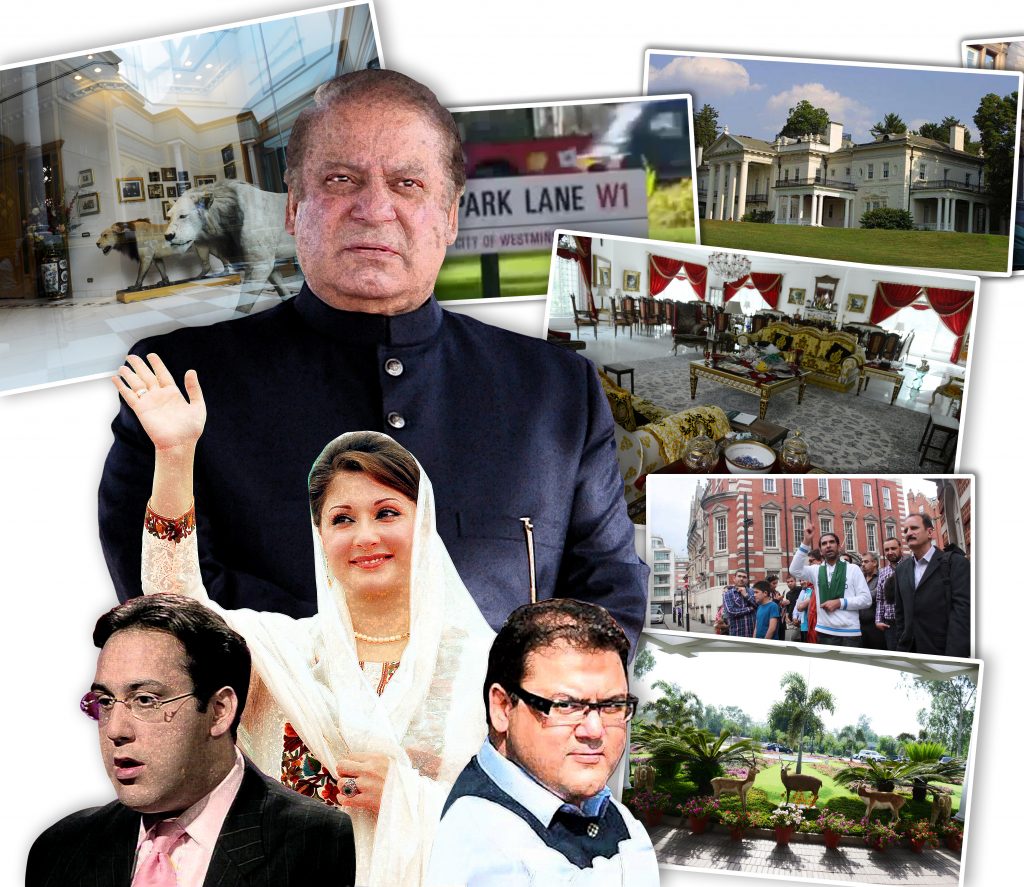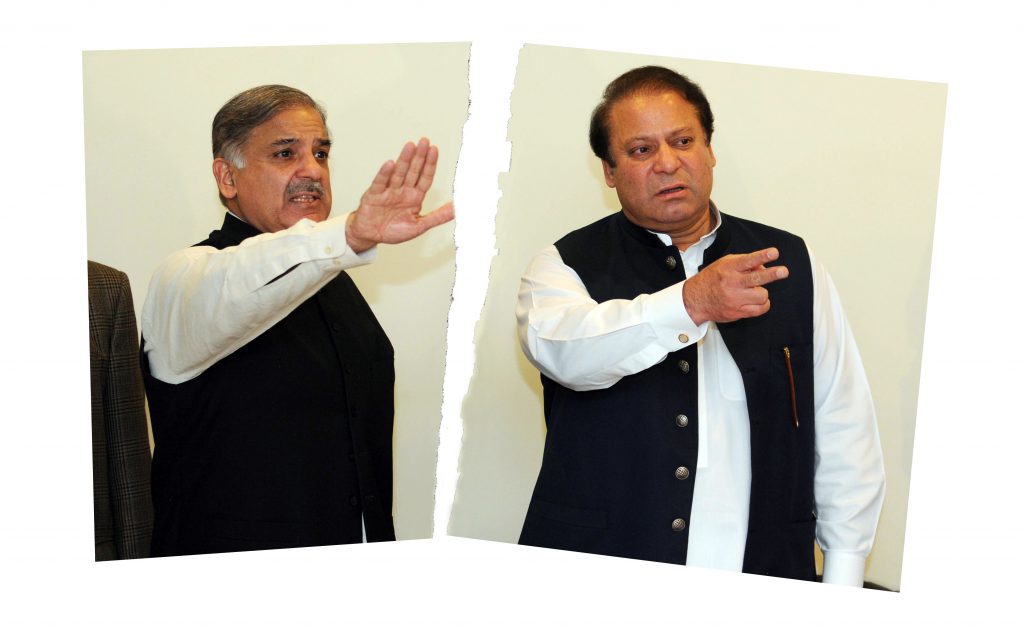In the Dock
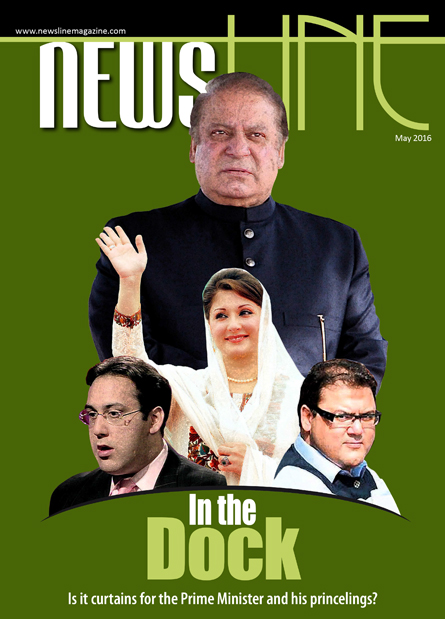
By Adnan Adil | Cover Story | Newsbeat National | Published 9 years ago
All eyes are set on the Supreme Court of Pakistan and the military establishment to see how they will respond to the unravelling situation arising out of revelations of offshore holdings of Prime Minister Nawaz Sharif’s children. The unearthed secret documents of the Panamarian law firm Mosseck Fonseca has triggered a storm in Pakistani politics and stepped up confrontation between the government and the opposition. Additionally, there have been strong signals emanating from army chief Raheel Sharif that he is as resolute about fighting corruption as he is about battling terrorism. The questions thrown up by the documents coming out of the Panama Papers scandal relate to money-laundering, tax evasion and non-declaration of assets — all charges that can lead to serious consequences. The foreign properties of Nawaz Sharif’s children had been speculated about earlier, but the leaked documents have verified the information beyond doubt. The Panama exposures have also corroborated what was written by Raymond W. Baker in his 2005 book Capitalism’s Achilles Heel, in which the author gave details of Nawaz Sharif’s family wealth stashed abroad and their pricey property in central London. The Observer did a similar story in 1998.
The Panama leaks are, however, the first time such charges have been substantiated by documentary evidence. And once that surfaced, the country’s opposition parties started raising difficult questions for the first family. From where did the children of Nawaz Sharif, including his daughter Maryam Nawaz, obtain this fabulous amount of wealth when they were minors? How can Maryam own and operate an offshore business considering she was ostensibly just a housewife, or at best a social activist, until very recently? And can Nawaz Sharif really dissociate himself from his children’s wealth and expect the nation to believe it was not of his making? These are just a few examples of the questions that have arisen.
Initially, Nawaz Sharif’s cabinet ministers tried to wriggle out of the Panama imbroglio by launching a smear campaign against the Pakistan Tehreek-e-Insaf chairman, Imran Khan, who is Sharif’s biggest detractor, and made efforts to obfuscate the issue. Instead of clarifying Nawaz Sharif’s position, PML-N federal ministers started raising questions about the foreign investments made by the Shaukat Khanum Memorial Trust founded by Imran Khan. And PML-N’s media team, headed by Information Minister Pervaiz Rashid and joined by PML-N MNA Danyal Aziz and Federal Railways Minister, Saad Rafique, turned their guns on the PTI chief.
In his first address to the nation after the Panama Leaks, PM Nawaz Sharif tried to elicit public sympathy for his family by narrating the story of the nationalisation of his family’s businesses in 1972. He said his family was rendered penniless at that time. He did not, however, mention that his family was not the only victim of the nationalisation carried out by Zulfikar Ali Bhutto in the early 1970s, as it was conducted across the board affecting thousands of industrialists. Nor did he mention how the Sharif family was the only privileged one to have their nationalised industry returned to them by then military ruler Gen. Zia-ul-Haq. Sharif also omitted mentioning the extraordinary favours bestowed on his family by the dictator: Zia wrote off a 400 million rupee loan taken by the Ittefaq Foundry, and then went a step further. Nawaz Sharif’s father was issued a grant of another 400-million-rupees to run the foundry. Brig (retd) Samson Simon Sharaf, who was holding a senior position in the army at that time, revealed this information in his tweet, saying his friend, Lt. Gen. (retd) Saeed Qadir, who was heading the denationalisation committee at that time, was witness to these transactions.
In a recent television interview, Hussain Nawaz stated that the Sharifs’ property in London was financed by the sale of their steel mill in Jeddah in 2006. Relevant documents, however, show the family’s exorbitantly pricey Mayfair flats were bought much before the Sharifs’ exile to Saudi Arabia. Television channels also ran video clips of one of Nawaz Sharif’s pet cronies, Siddiqul Farooq’s past interviews showing him saying that he had visited the Sharifs in these flats in the 1990s. Multiple contradictions in the statements issued by members of the Sharif family and members of the ruling PML-N, all vying to be more loyal than the king, further worsened PM Sharif’s standing.
Finally, in a bid to placate naysayers, Nawaz Sharif announced the setting up of a judicial commission to probe the allegations against him. However, this proposed ‘commission’ turned out to be a damp squib — an inquiry commission headed by a retired judge of the Supreme Court. While Sharif’s detractors railed against this and refused to accept it, Maryam Nawaz tweeted: “Despite no allegations of wrongdoing or illegality, PM Sharif presents himself and [his] family for accountability. Now prove or apologise.” The opposition were having none of it: they held fast to their dissent to the commission, saying it would be toothless and meaningless.
PTI chief Imran Khan stated: “Nothing short of a judicial commission under the Chief Justice of Pakistan would be acceptable to us.” Leader of the opposition, Khursheed Shah, said his party demanded an international forensic audit of Nawaz Sharif’s offshore holdings. And seeing the opposition parties’ disapproval of a commission headed by a retired judge, several retired judges stepped back from accepting the job. Meanwhile, the ruling PML-N continues to present the opposition’s protest over the Sharif family’s offshore assets as a conspiracy to subvert the economic development agenda, especially the China Pakistan Economic Corridor (CPEC) projects. Journalists allied with the PML-N, like Ataul Haq Qasmi, PTV chairman and ambassador to Norway during Nawaz Sharif’s previous regime, said as much, in print. In a column, he wrote: “…Sharif critics are failing to read the international dimensions of the present plot against the Sharifs.” Nawaz Sharif is up against not only an aggressive opposition, but also a divided house at home.
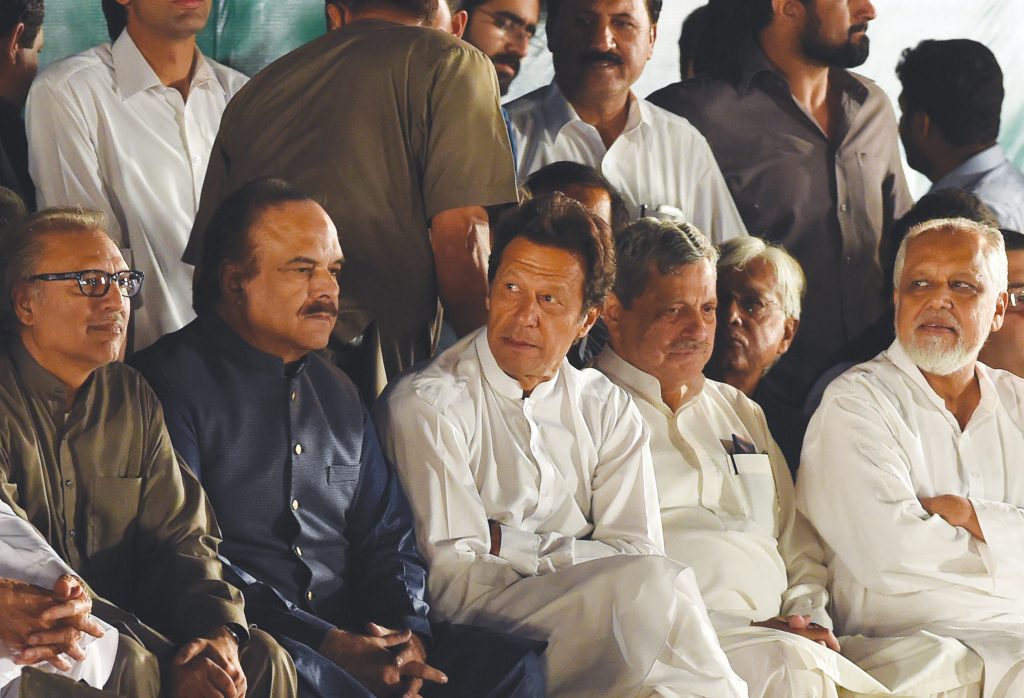 The Sharifs have always been considered a tightly-knit extended family, but the current crisis has revealed deep schisms within the clan. Although Shahbaz Sharif did come out in support of his beleaguered brother when the Panama scandal first broke, subsequently the Punjab Chief Minister’s second wife, Tehmina Durrani, issued a statement advising the Sharifs to clear their name of the corruption allegations and demanded that Nawaz Sharif’s family return their offshore wealth to the nation — even if the companies were legitimate. In one of her tweets, she said that “offshore companies, foreign properties and accounts may be legal, but these are (at least) unethical.” And she equalled unethical to “soul selling” in another tweet, a crime she said was worse than illegal acts. “The only way to clear the Sharif name is to keep to the minimum, simplify life drastically, return all foreign and local wealth to the nation,” she said.
The Sharifs have always been considered a tightly-knit extended family, but the current crisis has revealed deep schisms within the clan. Although Shahbaz Sharif did come out in support of his beleaguered brother when the Panama scandal first broke, subsequently the Punjab Chief Minister’s second wife, Tehmina Durrani, issued a statement advising the Sharifs to clear their name of the corruption allegations and demanded that Nawaz Sharif’s family return their offshore wealth to the nation — even if the companies were legitimate. In one of her tweets, she said that “offshore companies, foreign properties and accounts may be legal, but these are (at least) unethical.” And she equalled unethical to “soul selling” in another tweet, a crime she said was worse than illegal acts. “The only way to clear the Sharif name is to keep to the minimum, simplify life drastically, return all foreign and local wealth to the nation,” she said.
Although reports of some sporadic rumblings of tension between the brothers Sharif had done the rounds earlier, following Panama, reports of a rift and power struggle between the two families became far more obvious. Sources say that soon after the Panama leaks crisis erupted, the families of the two brothers met at Raiwind to deliberate over it, but ended up in a serious disagreement about the future course of action. There was reportedly a suggestion that Nawaz Sharif should go abroad on leave, and in his absence, Hamza Shahbaz, Shahbaz Sharif’s son — a member of the National Assembly — should be made Prime Minister as a stop-gap arrangement, until Shahbaz Sharif contested the election for the National Assembly and assumed the office of prime minister. The names of Shahbaz Sharif and his children have not surfaced as holders of any offshore company. So, those pleading his case maintained, he would be an acceptable figure to replace his elder brother.
Nawaz Sharif’s family disapproved. Maryam Nawaz and Hussain Nawaz reportedly made it clear that they would fight to the end for their father, come what may, and would not accept Hamza Shahbaz either as a temporary prime minister, or even as chief minister of Punjab. And even as rumours of this alleged rift became increasingly commonplace, a visibly embarrassed Maryam tweeted that there was no schism in the family. Insiders say that after Shahbaz Sharif’s departure, following the four-hour-long family session at Raiwind, Nawaz Sharif summoned a meeting of his close aides and a few senior bureaucrats and told them that he was proceeding abroad and that in his absence they were to only take orders from Ishaq Dar and not listen to anyone else — including Shahbaz Sharif and his son.
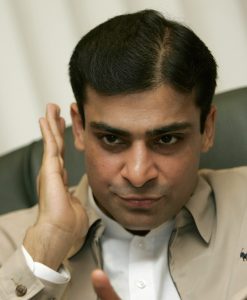 On April 13, Nawaz Sharif left for London claiming he needed a medical checkup there. Sharif’s media cell promptly issued a sentimental picture of Nawaz Sharif which showed him kissing his mother’s hand and receiving her blessings before his departure. The general consensus was that the PM’s media operators were trying to use such scenes to elicit public sympathy. Intriguingly, on his way to London, Nawaz Sharif made a brief stopover in Moscow, claiming this was due to technical difficulties en route. There he held a few meetings, but these, and all the details pertaining to them, remain wrapped in a cloak of secrecy. When Sharif arrived in London, rumours started doing the mills that a big businessman had conveyed a message to him from the establishment in which he was advised to stay abroad until his name was cleared through a judicial inquiry.
On April 13, Nawaz Sharif left for London claiming he needed a medical checkup there. Sharif’s media cell promptly issued a sentimental picture of Nawaz Sharif which showed him kissing his mother’s hand and receiving her blessings before his departure. The general consensus was that the PM’s media operators were trying to use such scenes to elicit public sympathy. Intriguingly, on his way to London, Nawaz Sharif made a brief stopover in Moscow, claiming this was due to technical difficulties en route. There he held a few meetings, but these, and all the details pertaining to them, remain wrapped in a cloak of secrecy. When Sharif arrived in London, rumours started doing the mills that a big businessman had conveyed a message to him from the establishment in which he was advised to stay abroad until his name was cleared through a judicial inquiry.
However, Nawaz Sharif decided to head back to Pakistan within the week — a move that showed he was in no mood to step down as prime minister on ethical grounds. In his address to army officers in Kohat, the same day as Nawaz Sharif’s return, army chief General Raheel Sharif made a strong statement against corruption, saying that there was a need for across-the-board accountability to preserve the solidarity, integrity and prosperity of the country, and that the war against terrorism could not be won unless the menace of corruption was uprooted. He also said the armed forces would fully support every meaningful effort in that direction. Keeping in view the army chief’s massive popularity and the military establishment’s traditional role in Pakistani politics, this statement was seen as particularly significant. Two days later, in an unprecedented move, the army chief led by example: he forced into retirement six high-ranking military officers, including a lieutenant general and a major general. The officers were stripped of their ranks and perks, including land and plots. Sources said inquiries against more officers were underway. This brought the government under more pressure for a judicial inquiry into the Panama Leaks. The very next day, in a matter of just three weeks, Prime Minister Nawaz Sharif made his second address to the nation. He yielded to the opposition’s demand and announced that he would write a letter to the Chief Justice of Pakistan to establish an inquiry commission comprising judges of the apex court for probing the issues that had arisen on account of the Panama Papers.
However, the PM’s move failed to pacify the opposition because of the terms of reference given to the Supreme Court by the government for the judicial commission. The government widened the scope of the commission’s inquiry to cover the cases of all the 200 odd Pakistanis whose names had surfaced in the Panama Papers, and also those who had got their bank loans written off. It was also said that the commission would set its own time limit for the inquiry. Critics said the purpose of initiating such a widespread inquiry was so that it could go on for at least 10 years. Imran Khan echoed this sentiment, saying, “This announcement has been made to bury justice and accountability.” The opposition, including the PTI chief, and PPP chairman Bilawal Bhutto insisted on a probe into the foreign accounts and assets of Prime Minister Nawaz Sharif’s family on a priority basis, before the commission conducted any inquiry into other people’s financial affairs.
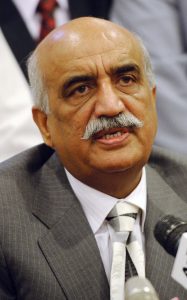
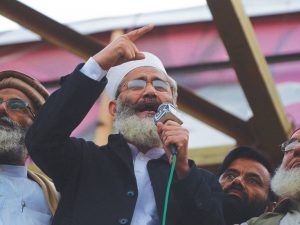 Under the law, the judiciary cannot amend the terms of reference or initiate a probe exclusively focusing on the Sharif family unless the government asks it do so. “Mian sahib, I am warning you, if you don’t formulate the ToRs in consultation with all opposition parties, I will be left with no option but to come out on the streets,” said Khan. Under pressure from the public, the opposition and the military establishment, Nawaz Sharif now seems to have decided to fight his case on the streets. The tone of his rhetoric in his second address to the nation was belligerent, and he also took on the army in a not-so-oblique reference to the military establishment. He said there should also be an inquiry against those people (a reference to military generals) who abrogated the constitution and dismissed elected governments in the past.
Under the law, the judiciary cannot amend the terms of reference or initiate a probe exclusively focusing on the Sharif family unless the government asks it do so. “Mian sahib, I am warning you, if you don’t formulate the ToRs in consultation with all opposition parties, I will be left with no option but to come out on the streets,” said Khan. Under pressure from the public, the opposition and the military establishment, Nawaz Sharif now seems to have decided to fight his case on the streets. The tone of his rhetoric in his second address to the nation was belligerent, and he also took on the army in a not-so-oblique reference to the military establishment. He said there should also be an inquiry against those people (a reference to military generals) who abrogated the constitution and dismissed elected governments in the past.
And in response to Imran Khan’s public rally in Islamabad, PML-N leaders issued aggressive, derogatory statements against the PTI chief. The PML-N is now holding political rallies in different parts of the country. The move reeks of a lurking fear in ruling circles that Nawaz Sharif risks an ouster from power, either as a result of the judicial inquiry soon to get underway or through direct military intervention. It appears Sharif intends toprepare his supporters for the political battles that he believes inevitably lie ahead and raise the stakes against his removal. The stance of both the government and the opposition has placed them in a position of direct confrontation. It is unlikely that Sharif will voluntarily step down, and the opposition promises to keep up the momentum by protesting on the streets. The possibility of clashes between the two sides cannot be ruled out. And so far it is possible that street agitation, more than the outcome of an inquiry, is Nawaz Sharif’s real problem.
According to legal observers, the judiciary’s capacity to deliver a verdict about the Sharif family’s offshore holdings is quite limited — and the inquiry commission’s entire fact-finding exercise is a dead-end. They even doubt that a ‘forensic audit firm’ will be able to unearth any meaningful details to buffer the opposition’s case, as they elucidate, no tax haven would divulge even a minor detail about a client to an audit firm. Those looking into the charges against the Sharifs should perhaps hearken back to 2000 when one of the Sharif family’s closest aides, Senator Ishaq Dar, made a confessional statement. Senator Dar’s handwritten 43-page statement, submitted before a magistrate on April 25, 2000, alleged that the Sharif brothers used the Hudaibiya Paper Mills as a cover for money laundering during the late 1990s. The amount involved, according to Dar, was nearly 15 million US dollars. Later, however, Ishaq Dar said that the signed statement was extracted from him under duress by the Musharraf military regime which had instituted a money laundering case against the Sharif brothers.
Insiders say the truth is that at that time Musharraf convinced Dar to spill the beans by offering him the position of prime minister. Dar’s deposition was recorded before a magistrate under section 164 of the Criminal Procedure Code (CrPC). In the statement, he accused Nawaz and Shahbaz Sharif of money laundering in the Hudaibiya Paper Mills case. In his statement, Dar said that on the instructions of Mian Nawaz Sharif and Shahbaz Sharif, “I opened two foreign currency accounts in the name of Sikandara Masood Qazi and Talat Masood Qazi with the foreign currency funds provided by the Sharif family from the Bank of America by signing as Sikandara Masood Qazi and Talat Masood Qazi.” Dar said that all instructions to the bank in the name of these two persons were signed by him under the orders of the “original depositors,” namely Mian Nawaz Sharif and Mian Shahbaz Sharif. According to him, “The foreign currency accounts of Nuzhat Gohar and Kashif Masood Qazi were opened in the Bank of America by Naeem Mehmood under my instructions (based on instructions by the Sharifs) by signing the same as Nuzhat Gohar and Kashif Masood Qazi.” In his statement, Dar had also stated that besides these foreign currency accounts, a previously opened foreign currency account of Saeed Ahmed, a former director of First Hajvari Modaraba Co and a close friend of Dar, and of Mussa Ghani, the nephew of Dar’s wife, were also used for huge foreign currency fund deposits, provided by “the Sharif family.”
On Sharif’s instructions these were to be used as collateral to obtain different direct and indirect credit lines. Senator Dar disclosed that the Bank of America, Citibank, Atlas Investment Bank, Al Baraka Bank and Al Towfeeq Investment Bank were used under the instructions of the Sharif family. According to him, an amount of $3.725 million from Emirates Bank, $ 8.539 million from Al Faysal Bank and $2.622 million were later transferred into the accounts of the Hudaibiya Paper Mills.
While this information from the past could prove damning, what could be more threatening to Nawaz Sharif is Imran Khan’s stepped-up street agitation — especially in the face of the mood of a nation completely fed up of its leaders’ shenanigans — and a loss of face in the international media.
The future course of Pakistani politics hinges on two factors: the length the Chief Justice of Pakistan, Anwer Zaheer Jamali, is willing to go to probe the offshore companies of Prime Minister Sharif’s children, and how much patience the military establishment shows towards a prime minister bereft of moral credibility. If the opposition’s agitation reaches a critical point, things could turn seriously ugly for Nawaz Sharif.



